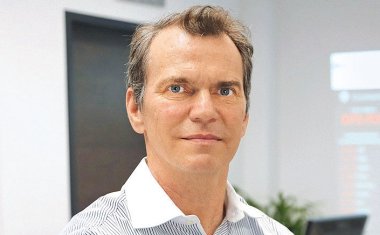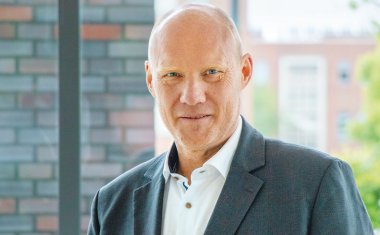Siemens Building Technologies Strengthens Security Solutions Business
By June 2015 the Siemens Building Technologies Division had concluded the sale of its Security Products business to the renowned U.S. security company Vanderbilt. In the September ...
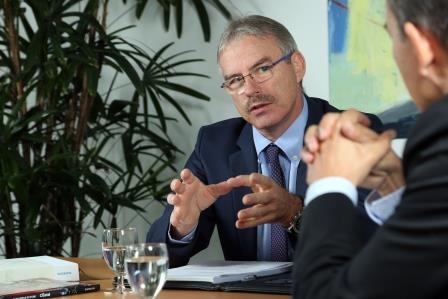
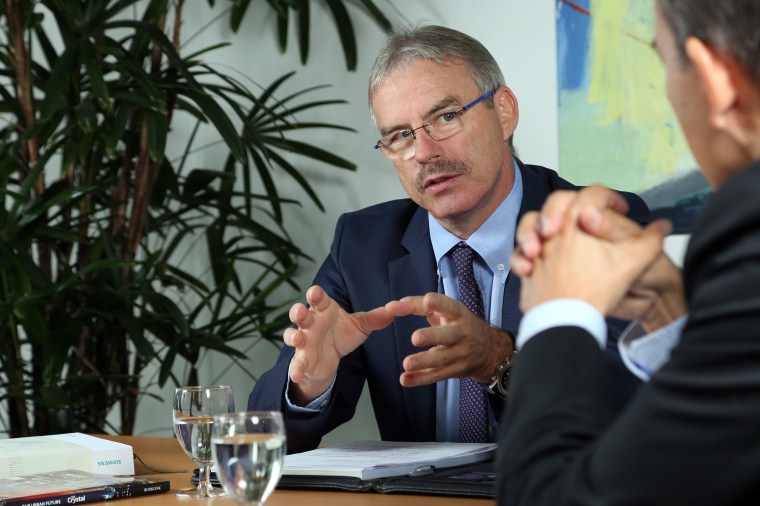
By June 2015 the Siemens Building Technologies Division had concluded the sale of its Security Products business to the renowned U.S. security company Vanderbilt. In the September issue of GIT SICHERHEIT we introduced Vanderbilt Industries, which took over the former product business of Siemens. Siemens Building Technologies is now focusing more than ever on developing comprehensive, integrated security solutions for its customers. At division headquarters in Zug, Heiko Baumgartner took the opportunity to talk with René Jungbluth, head of the worldwide Solutions and Service portfolio as well as strategy, about the reorientation.
GIT SECURITY: Mr. Jungbluth, can you tell our readers what motivated Siemens to sell the Security Products business, which supplied hardware for intrusion detection, access control and video surveillance?
René Jungbluth: Some time ago we reached the conclusion that our former Security Products business was no longer strategically essential to Siemens and that it would be better for us to focus on comprehensive, integrated security solutions for our customers. We then began to look for a buyer for the business and found Vanderbilt at the beginning of the year. However, this strategic move in no way means that Siemens is looking to exit the security business. On the contrary, security solutions are a fundamental pillar of our offering. Now our focus clearly lies in the development of security solutions for companies and their buildings and infrastructures, starting with office buildings for multinational firms all the way to critical infrastructures such as airports and energy suppliers.
But solutions still need advanced security products. Where do you purchase them once you have designed a solution?
René Jungbluth: We are continuing to augment our traditional strengths in the solutions business in building technology, and naturally we need products for that. But we have shifted our focus to software-based products. We are still offering our own security products, for example from our broad Siveillance portfolio and our Desigo CC building management platform. As far as hardware is concerned, such as intrusion detectors and video cameras, we procure the best and most cost-effective products on the market for our solutions. Our former products business, now owned by Vanderbilt, will remain a key supplier to Building Technologies for the long term. In the past, we found it extremely difficult to stay ahead of the technology curve in all areas of the widely diversified security products market, adapt the technology for the various regions and maintain the right distribution and sales channels in all countries. That’s why we gave up manufacturing and developing security hardware. On the other hand, the market for fire safety tends to be homogeneous, even though the requirements differ based on country-specific regulations. So we will continue to sell our own products in fire safety as well as in building automation. In contrast, the market for security products is too fragmented.
Are there other reasons for concentrating on solutions and, on the product front, on software, fire safety and building automation?
René Jungbluth: The line that used to clearly separate fire safety, security and building automation systems is rapidly disappearing. Convergence was and still is an important topic for us. Physical security practices in buildings are increasingly IT-heavy, and it’s the IT- and IP- based solutions that are driving convergence. Particularly in medium and large installations, existing IT infrastructures need to be integrated and utilized to a greater degree so business and security systems can be run in parallel. By concentrating on integrated software solutions, we are accommodating this trend. In hardware products, we had to carefully weigh where we could expect future business to be good, and those who offer mass-produced products for a wide public have a definite advantage. But that was not the core of our production, and we didn’t see our strengths and future in that direction. Our solutions are better established in the high-end market and call for customized, state-of-the-art and intelligent products in all areas.
What does the future product range look like?
René Jungbluth: Our customers demand integrated, end-to-end emergency and building automation solutions as well as services that generate security and added value. Our Total Building Solutions include such integrated solutions, which cover numerous disciplines: electrical installations, heating, ventilation and air conditioning, lighting, access control, video surveillance, alarm systems, fire safety and evacuation. Our job is to find complex solutions for the customer that at some point also include products. We have recognized that the added value we can offer our customers lies not primarily in individual products, but in our solutions and integration expertise.
How do you approach a project?
René Jungbluth: Simply put, we start by studying the building and analyzing the situation of the operator. What does the shell of the building look like, what function does the building serve, how is it subdivided and what is the situation on each floor? Often a manufacturing or high-security area like a data center or a sensitive production facility needs to be taken into consideration. Of course there are differences to consider. Is it a single office building or a campus infrastructure? Are there corporate security requirements? Are we dealing with a critical infrastructure, including perimeter protection? What all projects do share is that everything is combined into one system. In more simple buildings or a campus structure, our Desigo system can be used; for corporate security across locations, Siport is a better choice; and for critical infrastructures like power plants, ports and airports, we can use our Siveillance portfolio. Scaling customer solutions to actual needs and the ability to supply everything from a single source are concepts that Siemens Building Technologies applies throughout its business, not just in security. Once the analysis is finished and we know which system is most suitable, we turn to selecting the components for the video technology, access control, intrusion detection and fire detection technology. We look for products that are best suited to the task – be they our own or from third parties – and leverage our consulting expertise in the selection, integration and installation of the software.
What advantages does working with Siemens Building Technologies offer?
René Jungbluth: The fact that we are a global organization is a major advantage for most customers. That’s particularly important for corporate security across multiple locations that need to work with one system and a consistent concept. As a global company we offer truly global solutions. Furthermore, our background allows us to talk with customers about both physical security and IT security. Only a broad-based supplier like us, one that has moved away from the product paradigm and gathered the relevant experience inside our own firm, can do that. At Siemens we face the same challenges, with our various and far-flung divisions, different R&D departments, production sites and security challenges, and we solved them. What also sets us apart from other suppliers is the fact that we are an integrator that offers platforms ourselves and we are deeply involved in consulting. We help choose the ideal system, integrate the systems, and network everything to ensure optimal operation of all systems.
Siemens Building Technologies has over 400 branches throughout the world. Still, isn’t it difficult to appear equally competent in all areas of security in every country and for every customer? How do you deal with that organizationally?
René Jungbluth: Of course it is a difficult task. Organizationally we set up centers of competence in a number of regions – Germany, Europe, America, the Middle East and Asia – that specialize in the various aspects of the Siemens Building Technologies business. Our strategy is universally transparent and the centers are tightly networked. The centers of competence work together with the local subsidiaries on specific customer requests in order to develop customized solutions that incorporate local know-how and expertise in specialized fields.
The more you focus on solutions, the more you need to rely on partners. What is your philosophy in that respect?
René Jungbluth: You’re right; we can’t do it alone. We depend on those partnerships. For video management, for example, we work closely with the VMS partners and have already developed special solutions.
Siemens is known on the market for its strength in working with large, international firms. How are you pursuing this latest approach based on attracting small and medium-sized companies using new solutions?
René Jungbluth: We are certainly better known for our Siveillance solutions, which are usually deployed in Fortune 500 companies. Over the last few years, however, we have succeeded in positioning Desigo in the medium-range market segment. The Desigo CC building management system can unite very different systems and manage the essential disciplines in a building centrally, such as SiPass for access control, a video management system like Desigo Video and a fire detection system. This type of system can completely cover the requirements of many customers, and it continues to be at the core of our business. A Desigo system is also easy to integrate into a more comprehensive Siveillance system at a later time once security requirements grow or become more global in nature. With Desigo CC, we cover end-to-end building management for an office or even a campus and network many individual locations – even globally, if the customer so desires, with our Siveillance portfolio. That is how we support a globally standardized and cost-efficient security culture within a company.
What other trends do you see besides growing integration and convergence on the part of the customer?
René Jungbluth: Many companies are increasingly asking about the benefits of systems beyond security. They need help in securing their complex business processes and want more than just a security system. They want to know how to build security into their processes. We also see that more and more managers are taking their weighty security responsibilities to heart. They are well aware what it means if production failures loom, IT systems collapse or accidents occur, and in the worst case, they are personally called to account. Risk awareness at the CxO level is growing. Subjects like evacuation, voice alarming and emergency plans are more important than ever, and people have come to appreciate the peace of mind that comes from moving in a secure environment, having done everything necessary to minimize the risks. Comfort and security for employees and business continuity under all circumstances pay off every day.
Business Partner
Siemens Smart InfrastructureTheilerstrasse 1a
6300 Zug
Switzerland
most read

Safety and Security in an Emergency: How companies take responsibility with strategic personal protection and amok prevention
Personal protection & amok prevention: strategic concepts, training & responsibility for corporate safety and security

When the Internet stumbles: Why DNS is important
When DNS fails, the internet stumbles-AWS outage proves resilience and redundancy are vital for digital trust

Integrated and Futureproof: Traka’s Next Chapter
Interview with Stefni Oliver on Traka’s Vision for the Future
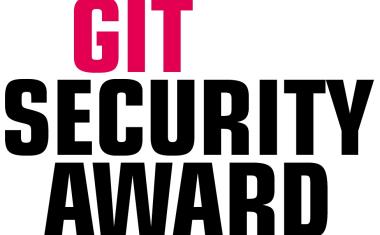
GIT SECURITY AWARD 2026 - The winners have been announced!
GIT SECURITY AWARD 2026: The best safety and security solutions of the year - now an overview of all winners


